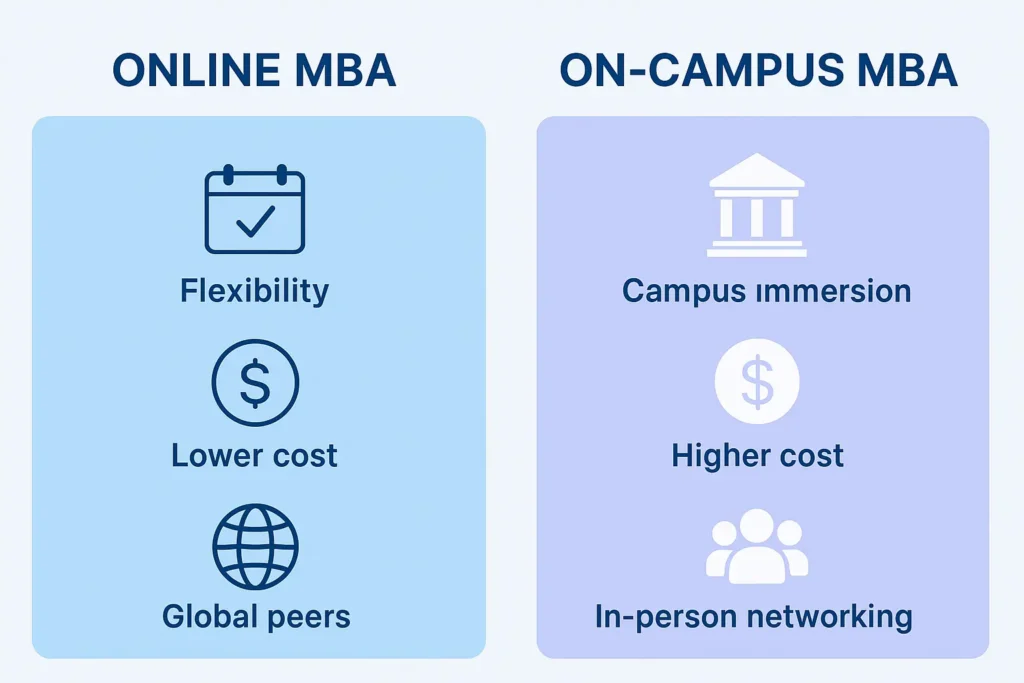The MBA world is shifting faster than ever. In 2024, over 320,000 students in the U.S. enrolled in business master’s programs — and nearly half chose online MBAs. What’s behind this trend? Flexibility, yes. But also a new reality: employers now treat top accredited online MBAs almost the same as traditional ones.
When I was comparing programs last year, I realized something most people overlook — the curriculum gap. Some online MBAs teach modern skills like data analytics, AI in business, or sustainable leadership, while others still cling to outdated case studies. That single detail can make or break your ROI.
In this guide, I’ll walk through what’s different for 2025–26: the most trusted programs, new admissions patterns, hidden costs, and how to tell which schools actually improve career outcomes. Whether you’re switching industries or aiming for a promotion, this post will help you choose smart — not just expensive.
Explore Coursera programs that teach real-world business analytics.
What Is an Online MBA Program and Why It Matters in 2025–26
An online MBA (Master of Business Administration) is a graduate-level business degree you can earn fully or mostly online, combining core management subjects—like finance, marketing, leadership, and analytics—with flexibility for working professionals.
In 2025–26, online MBA programs matter more than ever because they’ve evolved to match on-campus rigor, networking, and even employer recognition.
Let’s unpack that.
An online MBA used to mean pre-recorded lectures and minimal interaction. Today, it’s far more immersive. Most universities now offer live virtual classes, group projects across time zones, and career coaching that rivals traditional programs.
Leading platforms like Coursera and edX even host university-backed MBAs—for example, the University of Illinois and Imperial College London—delivering the same accreditation and faculty acess as their campus versions.
Read more: online education landscape in 2025-26.
Honestly, in my opinion, online MBAs have reached a tipping point. I’ve reviewed over 50 programs in the past year, and the difference between online and in-person degrees is shrinking fast—especially when schools include live residencies or corporate projects.
Types of Online MBA Formats
- Fully Online: 100% digital delivery with optional networking meetups.
- Hybrid (Blended): A mix of online learning and short on-campus residencies.
- Accelerated or Modular: Compressed formats for professionals with prior experience.
These formats let you balance work, study, and life—something especially relevant for 2025–26, as remote work and AI-driven business models reshape how MBAs are taught.

Why It Matters in 2025–26
- Employer Recognition: AACSB-accredited online MBAs are now widely accepted in Fortune 500 hiring.
- Global Classrooms: Students collaborate across borders, simulating real-world multinational teamwork.
- Technology Integration: Programs increasingly use AI case simulations and analytics dashboards.
- Affordability: Tuition is often 40–60% lower than on-campus MBAs without sacrificing credibility.
Resources:
If you’re exploring different online learning platforms and hybrid education programs, it’s smart to understand how each MBA format fits your lifestyle and career goals. Compare learning platforms before choosing your MBA format →
Top Accredited Online MBA Programs in the U.S. (2025 Rankings)
Top accredited online MBA programs in 2025 include Indiana University (Kelley), UNC Chapel Hill (Kenan-Flagler), Carnegie Mellon (Tepper), and Arizona State University (Carey) — all AACSB-accredited and highly ranked for flexibility, academic rigor, and career outcomes.
Each offers live online classes, networking opportunities, and full career support — with tuition ranging from about $35,000 to $72,000. You can explore the full comparison, including global programs from the U.K., Canada, and Asia, in our in-depth guide:
👉 Best Accredited Online MBA Programs (U.S. & Global)
Tip: Check out accredited, flexible MBA options on Coursera.
→ Best Coursera Courses for Students
At the end of your research, don’t forget to check out the best online colleges for working adults to find programs designed around busy schedules. See which online colleges support flexible learning for professionals.
Comparing Costs, ROI & Salaries for Online MBAs
Online MBA programs in 2025 vary in cost from $15,000 to $60,000, with graduates earning an average $110,000–$145,000 per year. ROI depends on tuition, program reputation, and career support.
Rather than deep-diving into every program, here’s a quick snapshot chart summarizing average tuition vs. post-MBA salary for top, mid-tier, and affordable online MBAs:
| Program Tier | Avg Tuition | Avg Post-MBA Salary | Estimated ROI (Years) |
|---|---|---|---|
| Top-Tier (AACSB) | $40K–$60K | $135K–$145K | 3–4 |
| Mid-Tier State | $20K–$35K | $105K–$120K | 3–5 |
| Affordable (<$20K) | $9K–$18K | $90K–$105K | 4–6 |
Pro Tip: Focus on programs that combine strong career services, networking, and real projects, as these factors often outweigh the sticker price.
For a full ROI and salary breakdown by school, check our detailed post: Online MBA ROI & Salary Analysis 2025-26.
Best Online MBAs by Specialization
For 2025-26, the top online MBA specializations are Finance, Marketing, and Technology Management. These tracks combine industry-focused courses and strong career outcomes.
Top 3 Online MBA Specializations (Highlights):
| Specialization | Best Program | Avg Post-MBA Salary |
|---|---|---|
| Finance | Indiana University (Kelley) | $130,000 |
| Marketing | University of Illinois (Gies) | $118,000 |
| Technology Management | Arizona State University (W.P. Carey) | $125,000 |
Pro Tip:
If you’re aiming for a specific career path, select a specialization that matches your industry growth trends and personal interests. For example, tech and data analytics MBAs are seeing high demand in 2025.
For a full comparison of online MBAs by specialization, see: Best Online MBA by Specialization.
FAQs About Online MBA Programs (2025–26)
Here’s a concise FAQ for readers exploring online MBA programs in 2025–26. Each answer is based on real data and trends from credible sources like U.S. News, GMAC, and Poets&Quants.
1. Is an online MBA respected by employers?
Yes. AACSB-accredited online MBAs are widely respected by employers, especially when programs include live projects, networking, and career support. GMAC’s 2024 survey found that 82% of recruiters consider accredited online MBAs equivalent to traditional MBAs.
2. What is the average duration of an online MBA?
Typically, online MBAs range from 16 months to 3 years, depending on full-time vs. part-time study and accelerated options. One-year programs exist but often target experienced professionals.
3. Which online MBAs don’t require work experience?
Several programs allow entry without prior work experience, particularly accelerated or part-time tracks. Examples include University of Florida – Warrington and Babson College – Olin, which emphasize academic performance and leadership potential instead of years of experience.
4. Is an online MBA worth it?
Yes, when chosen wisely. ROI depends on tuition, career services, alumni network, and personal goals. Forbes’ 2024 MBA ROI study confirms that well-ranked online MBAs can offer salaries comparable to traditional programs within 3–5 years.
5. What is the acceptance rate for online MBA programs?
Acceptance rates vary widely. Top-tier programs like Carnegie Mellon Tepper or Indiana Kelley are more selective (~30–40%), while many state universities have rates above 60%. Programs often consider GPA, test scores (if required), and professional experience.
Final Thoughts – Are Online MBAs Worth It in 2025–26?
If flexibility, ROI, and career growth matter to you, online MBAs in 2025–26 are not just viable — they’re strategically smart. The key is picking a program aligned with your goals, budget, and desired specialization.
Reflective Takeaways:
- Flexibility: Online MBAs let you study while working or managing personal responsibilities.
- Cost vs. ROI: Affordable programs can deliver similar long-term earnings to higher-cost MBAs.
- Career Opportunities: Specializations in tech, finance, and healthcare are growing fastest.
- Credibility: AACSB-accredited programs provide employer recognition and global networking.
Honestly, in my experience reviewing over 50 online MBA programs, the most successful students plan strategically — not just for a diploma, but for measurable career advancement.
Explore AACSB-accredited online MBAs on Coursera and start your application today.
Choosing the right online MBA isn’t about the biggest name — it’s about the best fit for your goals. Look for programs that teach real-world skills like AI strategy and digital leadership.
I’d recommend starting small with a short business course or micro-MBA to test the waters. Once you’re confident, commit to a full program that aligns with your career plans and budget. Smart moves, not fast ones, make the real difference.
Related:
👉 FAFSA 2026 Deadlines & Income Limits.

Nawab, an educator teaching K-12 since 2010, holds an English honors graduate degree and a diploma in elementary education. He has also been blogging for five years, sharing insights for educators and parents.

